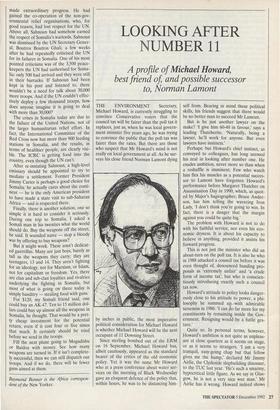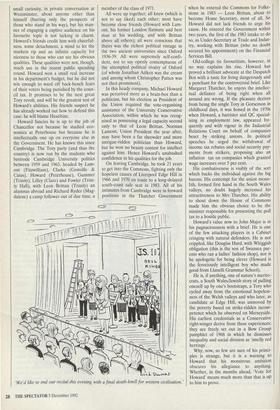LOOKING AFTER NUMBER 11
A profile of Michael Howard, best friend of and possible successor to, Norman Lamont
THE ENVIRONMENT Secretary, Michael Howard, is currently struggling to convince Conservative voters that the council tax will be fairer than the poll tax it replaces, just as, when he was local govern- ment minister five years ago, he was trying to convince the public that the poll tax was fairer than the rates. But there are those who suspect that Mr Howard's mind is not really on local government at all. As he sur- veys his close friend Norman Lamont dying by inches in public, the most imperative political consideration for Michael Howard is whether Michael Howard will be the next occupant of 11 Downing Street.
Since sterling bombed out of the ERM on 16 September, Michael Howard has, albeit cautiously, appeared as the standard bearer of the critics of the old economic policy. Yet it was the same Mr Howard who at a press conference about water ser- vices on the morning of Black Wednesday gave an eloquent defence of the policy that, within hours, he was to be distancing him-
self from. Bearing in mind these political skills, his friends suggest that there would be no better man to succeed Mr Lamont.
But is he just another lawyer on the make? 'I give him 60-40 in favour,' says a leading Thatcherite. 'Naturally, being a lawyer, he'll work for anyone. But even lawyers have instincts.'
Perhaps: but Howard's chief instinct, as conveyed to colleagues, has long seemed his zeal in looking after number one. He exudes ambition, never more so than when a reshuffle is imminent. Few who watch him flex his muscles as a potential succes- sor to Lamont have forgotten Howard's performance before Margaret Thatcher on Assassination Day in 1990, which, as quot- ed by Major's hagiographer, Bruce Ander- son, has him telling the wavering Iron Lady, 'I don't think you're going to win. In fact, there is a danger that the margin against you could be quite big.'
The problem with Howard is not to do with his faithful service, nor even his eco- nomic dryness. It is about his capacity to believe in anything, provided it assists his forward progress.
This is not just the minister who did an about-turn on the poll tax. It is also he who in 1988 attacked a council tax before it was even thought of, denounced banding pro- posals as 'extremely unfair' and 'a crude form of income tax', but who is conscien- tiously introducing exactly such a council tax now.
Howard's attitude to policy looks danger- ously close to his attitude to power, a phi- losophy he summed up *th admirable terseness in 1986: 'I can 10 far more for my constituents by remainiñ inside the Gov- ernment. Resigning woul e a futile ges- ture.'
Quite so. In personal terms, however, Howard's ambition is not quite as unpleas- ant at close quarters as it seems on stage, or as it seems to strangers. 'I am a very tranquil, easy-going chap but that fellow gives me the hump,' declared Mr Jimmy Airlie, the Clydeside shipbuilding dinosaur, to the TUC last year. 'He's such a smarmy, hypocritical little figure. As we say in Glas- gow, he is not a very nice wee man.' Mr Airlie has it wrong. Howard indeed shows small curiosity, in private conversation at Westminster, about anyone other than himself (barring only the prospects of those who stand in his way), but his man- ner of engaging a captive audience on his favourite topic is not lacking in charm. Howard's friends credit him with cheerful- ness, some detachment, a mind to let the markets rip and an infinite capacity for niceness to those who can see his obvious qualities. These qualities were not, though, much use in the recent public spending round. Howard won a small real increase in his department's budget, but he did not win enough to ward off back-bench fears of their voters being punished by the coun- cil tax. It promises to be the next great Tory revolt, and will be the greatest test of Howard's abilities. His friends suspect he has already worked out how to defend this case: he will blame Hese!tine.
Howard fancies he is up to the job of Chancellor not because he studied eco- nomics at Peterhouse but because he is intellectually one up on everyone else in the Government. He has known this since Cambridge. The Tory party (and thus the country) is now run by the students who bestrode Cambridge University politics between 1959 and 1963, headed by Lam- ont (Fitzwilliam), Clarke (Gonville & Caius), Howard (Peterhouse), Gummer (Trinity), Lilley (Clare) and Fowler (Trini- ty Hall), with Leon Brittan (Trinity) an alumnus abroad and Richard Ryder (Mag- dalene) a camp follower out of due time, a
member of the class of 1971.
All were up together; all knew (which is not to say liked) each other; most have become close friends (Howard with Lam- ont, his former London flatmate and best man at his wedding, and with Brittan above all others); all were conscious that theirs was the richest political vintage in the two ancient universities since Oxford 1936-39. All were supremely self-confi- dent, not to say openly contemptuous of the attempted political rivalry of Oxford (of whom Jonathan Aitken was the cream and among whom Christopher Patten was not then prominent).
In this heady company, Michael Howard was perceived more as a brain-box than a politician, but his election as President of the Union required the vote-organising assistance of the University Conservative Association, within which he was recog- nised as possessing a legal capacity second only to that of Leon Brittan. Norman Lamont, Union President the year after, may have been a far shrewder and more intrigue-ridden politician than Howard, but he won no beauty contest for intellect against him. Hence Howard's unabashed confidence in his qualities for the job.
On leaving Cambridge, he took 21 years to get into the Commons, fighting only the hopeless causes of Liverpool Edge Hill in 1966 and 1970 en route to a long-delayed south-coast safe seat in 1983. All of his intimates from Cambridge were in forward positions in the Thatcher Government 'We'd like to end our recital this evening with a final death-knell for western civilisation.' when he entered the Commons for Folke- stone in 1983 — Leon Brittan, about to become Home Secretary, most of all. So Howard did not lack friends to urge his cause. He entered the Government within two years, the first of the 1983 intake to do so, as Under-Secretary at Trade and Indus- try, working with Brittan (who no doubt secured his appointment) on the Financial Services Bill.
Old-college tie favouritism, however, in no way explains his rise. Howard has proved a brilliant advocate at the Despatch Box with a taste for living dangerously and a penchant for the controversial brief. Like Margaret Thatcher, he enjoys the intellec- tual defiance of being right when all around are wrong. If the pleasure derives from being the single Tory in Gorseinon in childhood days, it was honed in the 1970s when Howard, a barrister and QC special- ising in employment law, appeared fre- quently and with vigour in the Industrial Relations Court on behalf of companies beset by striking unions. In political speeches he urged the withdrawal of income tax rebates and social security pay- ments from strikers, proposing also an inflation tax on companies which granted wage increases over 5 per cent.
His combativeness is visibly of the sort which backs the individual against the big barons. His contempt for the union mono- lith, formed first hand in the South Wales valleys, no doubt hugely increased his attractiveness to Mrs Thatcher. His ability to shout down the House of Commons made him the obvious choice to be the minister responsible for presenting the poll tax to a hostile public.
Howard's value now to John Major is in his pugnaciousness with a brief. He is one of the few attacking players in a Cabinet cringing with natural defenders. He is not crippled, like Douglas Hurd, with Whiggish obligation (this is the son of Swansea par- ents who ran a ladies' fashion shop), nor is he apologetic for being clever (Howard is the ferociously intelligent boy who made good from Llanelli Grammar School).
He is, if anything, one of nature's merito- crats, a South Wales/Jewish story of pulling oneself up by one's bootstraps, a Tory who cycled away from the emotional hopeless- ness of the Welsh valleys and who later, as candidate at Edge Hill, was unmoved by the poverty based on strike-ridden incom- petence which he observed on Merseyside. His earliest credentials as a Conservative right-winger derive from these experiences; they are freely set out in a Bow Group pamphlet of 1968 in which he dismisses inequality and social division as 'smelly red herrings'. Why, now, so few are sure of his princi- ples is strange, but it is a warning to Howard that his monstrous ambition obscures his allegiance to anything. Whether, in the months ahead, 'Vote for Howard' means much more than that is up to him to prove.











































































 Previous page
Previous page